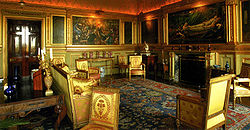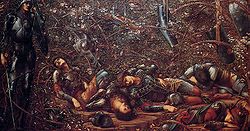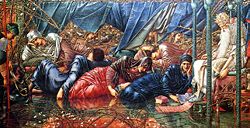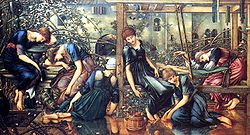
The Legend of Briar Rose
Encyclopedia

Edward Burne-Jones
Sir Edward Coley Burne-Jones, 1st Baronet was a British artist and designer closely associated with the later phase of the Pre-Raphaelite movement, who worked closely with William Morris on a wide range of decorative arts as a founding partner in Morris, Marshall, Faulkner, and Company...
which were completed between 1885 and 1890. The four original paintings - The Briar Wood, The Council Chamber, The Garden Court and The Rose Bower - and an additional ten adjoining panels, are located at Buscot Park
Buscot Park
Buscot Park is a country house at Buscot near the town of Faringdon in Oxfordshire. It was built in an austere neoclassical style between 1780 and 1783 for Edward Loveden Townsend. It remained in the Loveden Townsend family until sold in 1859 to Robert Tertius Campbell, an Australian...
in Oxfordshire
Oxfordshire
Oxfordshire is a county in the South East region of England, bordering on Warwickshire and Northamptonshire , Buckinghamshire , Berkshire , Wiltshire and Gloucestershire ....
, United Kingdom
United Kingdom
The United Kingdom of Great Britain and Northern IrelandIn the United Kingdom and Dependencies, other languages have been officially recognised as legitimate autochthonous languages under the European Charter for Regional or Minority Languages...
.
The four major panels were first exhibited at Agnew's Gallery in Bond Street
Bond Street
Bond Street is a major shopping street in the West End of London that runs north-south through Mayfair between Oxford Street and Piccadilly. It has been a fashionable shopping street since the 18th century and is currently the home of many high price fashion shops...
, London
London
London is the capital city of :England and the :United Kingdom, the largest metropolitan area in the United Kingdom, and the largest urban zone in the European Union by most measures. Located on the River Thames, London has been a major settlement for two millennia, its history going back to its...
in 1890. They were acquired by Alexander Henderson
Alexander Henderson, 1st Baron Faringdon
Alexander Henderson, 1st Baron Faringdon, CH , known as Sír Alexander Henderson, 1st Baronet, from 1902 to 1916, was a British financier and Liberal Unionist Member of Parliament.- Biography :...
, later to become the Lord Faringdon, for Buscot Park. When Burne-Jones visited the house and saw the paintings in their new setting he decided to extend the frames of each of the four paintings and fill in the gaps with joining panels which continued the rose motif from the main paintings.
Major panels
Each major panel measures 49 by 98¼ inches but the ten joining panels vary in width. The paintings do not tell a sequential story but record the same moment in each location.The Briar Wood

Running beneath each of the major panels is an inscription of a poem by William Morris
William Morris
William Morris 24 March 18343 October 1896 was an English textile designer, artist, writer, and socialist associated with the Pre-Raphaelite Brotherhood and the English Arts and Crafts Movement...
, under The Briar Wood the inscription reads:
"The fateful slumber floats and flows
About the tangle of the rose.
But lo the fated hand and heart
To rend the slumberous curse apart."
The Council Chamber

Under The Council Chamber, the inscription reads:
"The threat of war the hope of peace
The Kingdoms peril and increase
Sleep on and bide the latter day
When fate shall take his chain away."
The Garden Court

Loom
A loom is a device used to weave cloth. The basic purpose of any loom is to hold the warp threads under tension to facilitate the interweaving of the weft threads...
. The walls of the castle form the backdrop to the painting as do arches of roses.
Under The Garden Court, the inscription reads:
"The maiden plaisance of the land
Knoweth no stir of voice or hand
No cup the sleeping waters fill
The restless shuttle lieth still."
The Rose Bower

Under The Rose Bower, the inscription reads:
Here lies the hoarded love the key
To All the treasure that shall be
Come fated heart the gift to take
And smite the sleeping world awake."
Subject
The paintings depict a moment in the story of Sleeping BeautySleeping Beauty
Sleeping Beauty by Charles Perrault or Little Briar Rose by the Brothers Grimm is a classic fairytale involving a beautiful princess, enchantment, and a handsome prince...
, the title of the series coming from the version presented by the Brothers Grimm
Brothers Grimm
The Brothers Grimm , Jacob Grimm and Wilhelm Grimm , were German academics, linguists, cultural researchers, and authors who collected folklore and published several collections of it as Grimm's Fairy Tales, which became very popular...
in their collection of 1812.
Related works
Burne-Jones created two other series of paintings on the same subject.- The Small Briar Rose series was completed before the Buscot Park series. All three paintings - The Briar Wood, The Council Chamber, The Rose Bower - are now in the Museo de Arte de PoncePonce Museum of ArtMuseo de Arte de Ponce, or MAP, is an art museum located on Las Americas Avenue in Ponce, Puerto Rico. It is considered the finest art museum in Puerto Rico. It houses a collection of European art, as well as work by Puerto Rican artists. The largest art museum in the Caribbean, it has also been...
, Puerto Rico. - The Third Briar Rose series was completed after the Buscot Park series. The three paintings have been split between three collections. The Garden Court is in Bristol City Museum and Art GalleryBristol City Museum and Art GalleryThe Bristol City Museum and Art Gallery is a large museum and art gallery in Bristol, England. It is run by the city council with no entrance fee. It holds designated museum status, granted by the national government to protect outstanding museums...
, The Council Chamber is in the Delaware Art MuseumDelaware Art MuseumThe Delaware Art Museum is an art museum located on the Kentmere Parkway in Wilmington, Delaware, which holds a collection of more than 12,000 works. The museum, was founded in 1912 as the Wilmington Society of the Fine Arts in honor of the artist Howard Pyle and is now celebrating its centennial...
, Wilmington and The Rose Bower is in the Hugh Lane Gallery of Modern ArtHugh Lane Municipal GalleryDublin City Gallery The Hugh Lane is an art gallery funded by Dublin City Council and located in Charlemont House in Dublin, Ireland. Charlemont House was originally the town house of James Caulfeild, the 1st Earl of Charlemont and was designed by Sir William Chambers.Previously called the...
, Dublin.

